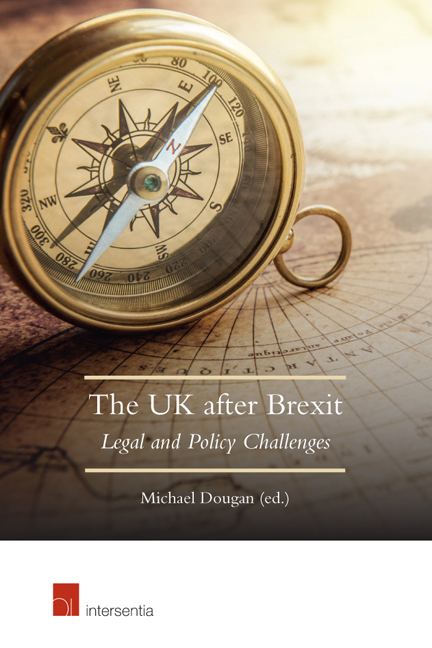Book contents
- Frontmatter
- Contents
- List of Authors
- Editor's Introduction
- Part I Constitutional Issues
- Chapter 1 Brexit: The Relationship between the UK Parliament and the UK Government
- Chapter 2 Devolution
- Chapter 3 The ‘Brexit’ Threat to the Northern Irish Border: Clarifying the Constitutional Framework
- Chapter 4 Brexit and UK Courts: Awaiting Fresh Instruction
- Part II Substantive Policies
- Part III External Relations
- About the Editor
Chapter 1 - Brexit: The Relationship between the UK Parliament and the UK Government
from Part I - Constitutional Issues
Published online by Cambridge University Press: 13 October 2018
- Frontmatter
- Contents
- List of Authors
- Editor's Introduction
- Part I Constitutional Issues
- Chapter 1 Brexit: The Relationship between the UK Parliament and the UK Government
- Chapter 2 Devolution
- Chapter 3 The ‘Brexit’ Threat to the Northern Irish Border: Clarifying the Constitutional Framework
- Chapter 4 Brexit and UK Courts: Awaiting Fresh Instruction
- Part II Substantive Policies
- Part III External Relations
- About the Editor
Summary
INTRODUCTION
The relationship between the UK Parliament and the UK Government is at the heart of the UK constitution. Between Parliament – the UK's legislature – and the Government – understood here as the institution which sits at the head of the executive branch, and which has ultimate responsibility for the administration of the state – the most crucial decisions as to the shape of law and policy in the UK are made. The decision to withdraw from the European Union (EU) is clearly one of the most profound governmental choices the UK has ever faced, and will have implications for law and policy of the very highest order. It is a position that has been reached as a direct result of a series of decisions made and actions taken by the UK Parliament and Government, albeit in a more complex fashion than is usually the case, given the constitutional significance of exiting the EU. But it is not only a decision which has been, in effect, taken by the UK Parliament and Government, acting in conjunction with others, most obviously the electorate which voted to leave the EU in the June 2016 referendum. Instead, the decision to exit the EU is also a decision that has the potential to test the boundaries of, and perhaps even alter, the relationship between the UK Parliament and Government.
In this sense, the decision to exit the EU is one which will be delivered by the UK Parliament and Government – with immense consequences throughout the UK's legal system, as is evident in the substantive chapters of this book – but also one which may come to impact on our understanding of the relationship between these institutions. Against this backdrop, this chapter has three aims: first, to explore how the process of Brexit is to be executed by the UK Parliament and Government, which itself depends on the way we conceive of the relationship between these institutions; second, to understand the complications for the domestic Brexit process that may result from the nature of that constitutional relationship; and third, to anticipate challenges that may be posed for both in the future.
- Type
- Chapter
- Information
- The UK after BrexitLegal and Policy Challenges, pp. 15 - 34Publisher: IntersentiaPrint publication year: 2017
- 1
- Cited by



